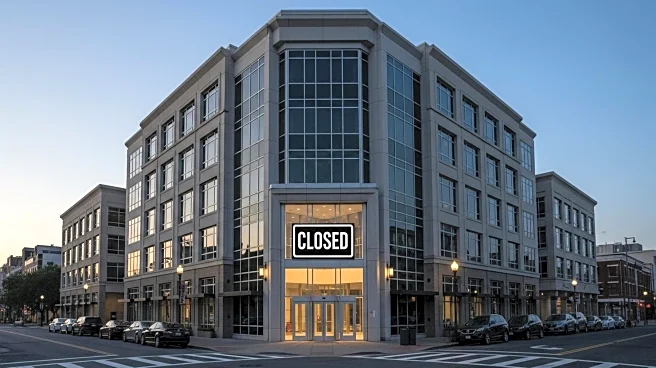What's Happening?
The ongoing U.S. federal government shutdown is having significant repercussions on the commercial real estate (CRE) sector. The shutdown has led to delays in government data releases, such as the monthly employment report from the Bureau of Labor Statistics, which are crucial for investors making economic and interest rate decisions. The Commercial Real Estate Alliance (CREA) has highlighted potential consequences, including reduced demand for CRE as businesses and government agencies delay or cancel leasing and development projects. Additionally, there is greater difficulty for CRE investors and developers in obtaining financing and conducting transactions due to market uncertainty and volatility. The shutdown also affects specific sectors like retail and hospitality, which are consumer-driven and could see a drop in spending, especially in areas with a high concentration of federal workers.
Why It's Important?
The government shutdown's impact on the commercial real estate sector is significant as it introduces uncertainty and delays in critical economic data, affecting investor confidence and decision-making. The CRE sector, which relies on stability and predictability, faces challenges in securing financing and completing transactions. Retail and hospitality sectors are particularly vulnerable due to their dependence on consumer spending, which may decline as federal employees face furloughs or layoffs. The shutdown also affects federal CRE markets, with potential delays in property sales and lease agreements managed by the General Services Administration. Companies like Easterly Government Properties, which depend on government rent payments, could be impacted if the shutdown persists.
What's Next?
If the government shutdown continues, further delays in economic data releases and government approvals for CRE projects are expected. This could exacerbate market uncertainty and lead to tighter credit conditions. Stakeholders in the CRE sector, including investors, developers, and businesses, will need to navigate these challenges and adjust their strategies accordingly. The duration of the shutdown will play a critical role in determining the extent of its impact on the CRE sector and related industries.
Beyond the Headlines
The shutdown highlights the broader issue of political risk in the real estate market, emphasizing the need for investors to consider such factors in their decision-making processes. The situation also underscores the interconnectedness of government operations and the private sector, particularly in areas like real estate that rely on government data and approvals. Long-term, the shutdown could prompt a reevaluation of risk management strategies within the CRE sector.










